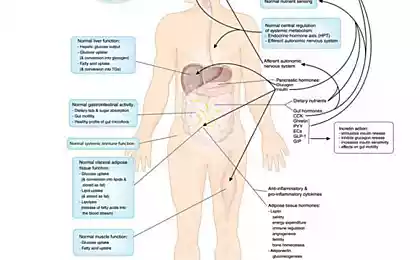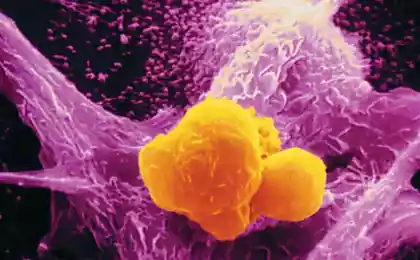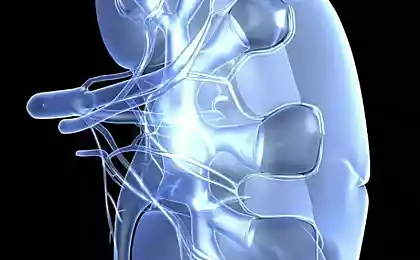448
How intermittent fasting affects the brain
Often, healthier people are asking, why should they strategy food restrictions? Answer: in order to maintain their General health, especially brain health. Without a healthy brain we would not be able to appreciate the beauty of longevity. And our food is an important part of caring for the health of the brain.
It is built on three key mechanism for maintaining health:

Here, 18 studies have confirmed the protective effect of periodic fasting (abstinence) in the brain: 1. Increases the results in tests of memory, as shown in a study of 50 normal elderly patients after falling 30% calorie content for 3 months (Witte et al., 2009).
2. Increases resistance to age-related diseases. In Parkinson's disease, periodic abstinence from food preserves dopaminergic neurons and reduces the progression of the disease. In Alzheimer's disease, post prevents the accumulation of incorrectly folded proteins. In Huntington's disease post normalizes the level of brain-derived neurotrophic factor which slows degeneration of neurons (Mattson et al., 2008;. Duan Dr, 2003b). The following post once or twice a week will help to protect the brain from degenerative diseases such as Parkinson's disease and Alzheimer's disease, according to research by the national Institute on ageing in Baltimore, USA. "Reducing calorie consumption could help the brain, but simply reducing meals is not the best way to activate this protection. It is best to alternate periods of fasting, during which you almost do not eat anything with those periods in which you eat whatever you want," says mark Mattsson, head of the laboratory of neuroscience at the Institute. 3. Slows age-related cognitive decline by maintaining long-term synaptic potentiation, which is associated with learning and memory (Hori and others, 1992).
4. Keeps the Central mechanisms of the eye stimulates the restoration of plasticity in visual cortex (Spolidoro et al., 2011). 5. Prevents age-related hearing lossin wild type mice (Someya., 2010).
6. Prevents age-related brain atrophyin elderly rhesus monkeys (Willette., 2012a).
7. Enhances energy production by protecting mitochondria from damage associated with aging (Liu et al., 2006).
8. Improves memory, decision making, and emotional control, keeping the volume of brain structures involved in these processes, including the hippocampus, amygdala, and prefrontal cortex (Willette., 2012b).
9. Supports optimal learning mechanism for synaptic plasticity in the ageing process (Mattson 2012).
10. Increases neurogenesis and its stimulating trophic factors such as BDNF, insulin-podobnoy growth factor 1 and growth factor vascular endothelial cells (Lee et al., 2002; Cheng et al. 2003; Joseph D Ercole, and you, 2008; and others Trejo et al., 2008).
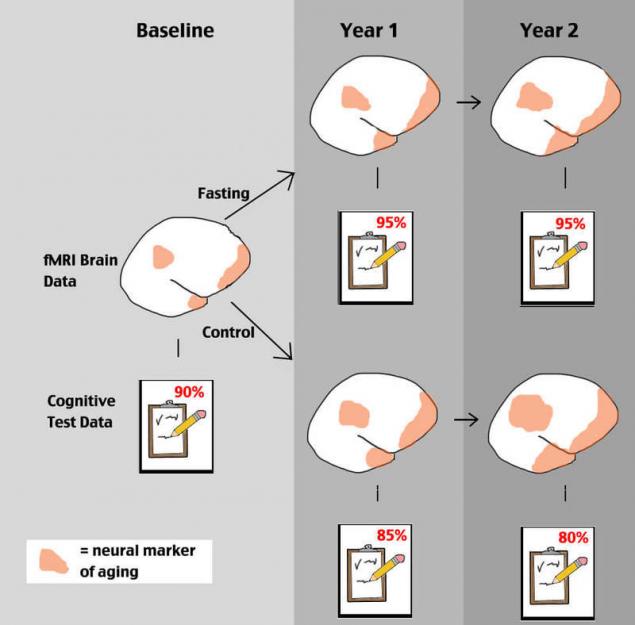
11. Reduces inflammatory markers, such as proinflammatory cytokines in the blood (Harvey et al., 2011). 12. Increases blood flow and functional relationships in important regions of the brain, including the hippocampus and anterior cingulate cortex (Burdett., 2010).
13. Increases neural connections by increasing the electrical and synaptic activity (Voss et al., 2010).
14. Prevents the death of neurons by inducing transcription factors, which are responsible for the expression of genes involved in the regulation of cell survival (Mattson, 2008).
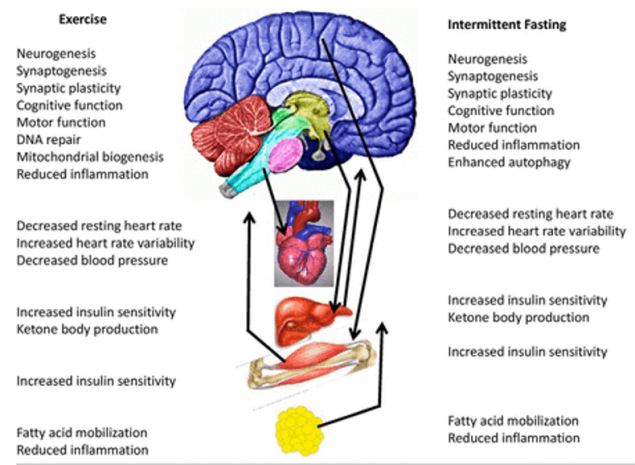
15. Struggling with the pathology of neurons by increasing levels of proteins that prevent the accumulation of incorrectly folded proteins that is a hallmark feature of Alzheimer's disease and Parkinson's disease (Rubinsztein., 2011). 16. Slows down cellular aging feature, expressed by the accumulation of reactive oxygen species, resulting in the positive regulation of enzymes that inhibit oxidative stress (Hyun et al., 2006). Also interesting: Learn how weekly fasting will preserve Your youth Hunger allows you to remove old cell debris and replace it with new cells 17. Preserves DNA integrity by attenuating age-related decline of DNA repair enzyme APE1 (Kisby., 2010).
18. Stimulates autophagy in neurons, which improves the removal of damaged proteins and fragments of dead cells (Alirezaei., 2010).published Author: Andrey Blueskin
Source: www.beloveshkin.com/2015/07/periodicheskoe-golodanie-post-i-zdorovyj-mozg.html
It is built on three key mechanism for maintaining health:
- the process of autophagy,
- the transition to the economy mode of metabolism,
- the effect of the hormone ghrelin.

Here, 18 studies have confirmed the protective effect of periodic fasting (abstinence) in the brain: 1. Increases the results in tests of memory, as shown in a study of 50 normal elderly patients after falling 30% calorie content for 3 months (Witte et al., 2009).
2. Increases resistance to age-related diseases. In Parkinson's disease, periodic abstinence from food preserves dopaminergic neurons and reduces the progression of the disease. In Alzheimer's disease, post prevents the accumulation of incorrectly folded proteins. In Huntington's disease post normalizes the level of brain-derived neurotrophic factor which slows degeneration of neurons (Mattson et al., 2008;. Duan Dr, 2003b). The following post once or twice a week will help to protect the brain from degenerative diseases such as Parkinson's disease and Alzheimer's disease, according to research by the national Institute on ageing in Baltimore, USA. "Reducing calorie consumption could help the brain, but simply reducing meals is not the best way to activate this protection. It is best to alternate periods of fasting, during which you almost do not eat anything with those periods in which you eat whatever you want," says mark Mattsson, head of the laboratory of neuroscience at the Institute. 3. Slows age-related cognitive decline by maintaining long-term synaptic potentiation, which is associated with learning and memory (Hori and others, 1992).
4. Keeps the Central mechanisms of the eye stimulates the restoration of plasticity in visual cortex (Spolidoro et al., 2011). 5. Prevents age-related hearing lossin wild type mice (Someya., 2010).
6. Prevents age-related brain atrophyin elderly rhesus monkeys (Willette., 2012a).
7. Enhances energy production by protecting mitochondria from damage associated with aging (Liu et al., 2006).
8. Improves memory, decision making, and emotional control, keeping the volume of brain structures involved in these processes, including the hippocampus, amygdala, and prefrontal cortex (Willette., 2012b).
9. Supports optimal learning mechanism for synaptic plasticity in the ageing process (Mattson 2012).
10. Increases neurogenesis and its stimulating trophic factors such as BDNF, insulin-podobnoy growth factor 1 and growth factor vascular endothelial cells (Lee et al., 2002; Cheng et al. 2003; Joseph D Ercole, and you, 2008; and others Trejo et al., 2008).

11. Reduces inflammatory markers, such as proinflammatory cytokines in the blood (Harvey et al., 2011). 12. Increases blood flow and functional relationships in important regions of the brain, including the hippocampus and anterior cingulate cortex (Burdett., 2010).
13. Increases neural connections by increasing the electrical and synaptic activity (Voss et al., 2010).
14. Prevents the death of neurons by inducing transcription factors, which are responsible for the expression of genes involved in the regulation of cell survival (Mattson, 2008).

15. Struggling with the pathology of neurons by increasing levels of proteins that prevent the accumulation of incorrectly folded proteins that is a hallmark feature of Alzheimer's disease and Parkinson's disease (Rubinsztein., 2011). 16. Slows down cellular aging feature, expressed by the accumulation of reactive oxygen species, resulting in the positive regulation of enzymes that inhibit oxidative stress (Hyun et al., 2006). Also interesting: Learn how weekly fasting will preserve Your youth Hunger allows you to remove old cell debris and replace it with new cells 17. Preserves DNA integrity by attenuating age-related decline of DNA repair enzyme APE1 (Kisby., 2010).
18. Stimulates autophagy in neurons, which improves the removal of damaged proteins and fragments of dead cells (Alirezaei., 2010).published Author: Andrey Blueskin
Source: www.beloveshkin.com/2015/07/periodicheskoe-golodanie-post-i-zdorovyj-mozg.html
Developed Li-ion battery with solid electrolyte
Lake in Russia, which every August becomes "pink jelly"
















